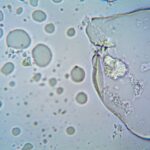Gut health and immunity: What’s the connection?

Worried about your gut health and immunity? We can help you understand it. Let’s brush some basics. From the moment we’re born, our bodies are exposed to various microbes. These are tiny, microscopic beings you can find everywhere around you. They’re in the soil, water, and air, and interact with the human body in different ways. Your gut health and immune system are important and they should not be ignored.
While some are good at strengthening our immune health, others can be harmful. These microorganisms are usually cause infections and increase the risk .
The average human body consists of numerous microbes, also known as microorganisms. These reside in our body in the trillions. Don’t worry, though, as these microbes are responsible for improving our health.
Bacteria, viruses and fungi are the most common microbes. They also help in maintaining gut health and their presence help strengthen the immune system.
The astonishing number of microbes in our body is a collection of organisms which make up something called microbiomes, and they naturally live and sustain themselves inside our bodies.
These microbes are essential to the entire concept of health and disease, as these organisms are responsible for strengthening the immune system. They help is distinguish between harmful and harmless microbes.
As far as research and study in this field of biology goes, the scientific domain has made numerous advancements.
One of the theories experts have uncovered is centred on how the microbiome affects the development of the immune system and how it’s dependent on the gut health.
What is the Immune System?
Your immune system protects your body from harmful pathogens such as bacteria, viruses and other foreign substances that enter your body through the environment.
This system comprises many organs, cells and proteins that work in harmony. Essentially, the immune system consists of 2 sub-classifications which work in tandem with each other: the innate and the adaptive immune system.
How are they different from each other? The basic distinction between them is that we are born with the innate immune system, while, as the name suggests, the adaptive system is developed when our bodies are exposed to microbes. In a way gut health and immune system are connected to each other in many ways.
Functions benefiting Gut Health and Immunity
One of the main functions of the immune system is that it protects you from diseases and infections and heals any wounds that may occur.
Much of the immune system is inside your G.I tract, so the microbiome is interconnected and reliant on the immune system for the gut to properly function.
When the body consumes nutrient-rich food, the beneficial bacteria protect the gut from harmful bacteria, benefiting gut health and immunity.
This bacteria produces substances known as short-chain fatty acids, which maintain mucus production and intestinal barrier integrity, which helps reduce inflammation and consequently, the risk of developing colorectal cancer.
This primarily consists of Butyrate, responsible for breaking down the large dietary fibre in your large intestine, Propionate, which is produced in the liver and small intestine, and acetate, the main function of which is to produce energy and synthesise lipids.
These fatty acids reduce inflammation and boost your immunity as well. If your gut’s SCFA production is lacking, it may cause a weak immune system.
What’s more, the immune system creates an environment within the microbiome, letting new microbes thrives.. Similarly, it removes the bad ones.
It does this by using the molecules within the microbes to classify them as good or bad, and the immune system decides whether to eliminate said microbe accordingly.
Good microbes regulate the immune system and prevent any possible disease, making us less susceptible to auto-immune diseases.
Food, Gut Health and Immunity
Your overall daily diet does not just affect your energy levels and weight but your overall gut health and immunity. The food you eat directly affects your microbiomes and produces different types of bacteria in the gut. It is helpful to both your gut health and immune system.
For example, a diet rich in sugar and processed foods produces bacteria that promote inflammation, chronic disorders, and infections.
Therefore, good nutrition is very important for your immune system and a diverse microbiota.
When it comes to nutrition, there is a variety of different fruits and vegetables recommended, which include:
- Oranges and broccoli are a source of vitamin C, which helps increase your blood levels.
- Spinach and carrots contain carotene, which helps fight toxins
Some foods also strengthen the gut, reinforcing the gut barrier for further protection. These foods include:
- Fermented products, such as Keft, Kimchi and Yoghurt, contribute to a more diverse microbiota
- Probiotic yoghurt and kefir, which contain probiotics, benefiting to your gut’s overall health
The purpose of probiotics is to assist in bacteria growth in your immune system, helping SCFA production as well. These fibres are not digestible and travel to your lower digestive tract to build up bacteria in your gut.
Additionally, we recommended you:
- Eat plenty of plant-based products such as legumes or whole grains
- Consume food consisting of good fats by cooking them with olive oil.
- Partake in efficient protein consumption every chance you get.
- When preparing food, try to use more naturally produced herbs and spices.
I understand that all of this must be very confusing and would take a while to adjust, so I recommend you check out the Superfoods Cookbook, with over 60 simple recipes for a healthy diet.
Brief Summary
The microbiota is responsible for stimulating the immune system, breaking down harmful toxins, and synthesizing certain vitamins.
The correct way to improve your microbiome is to follow a healthy diet. To conclude, you should take care of both your gut health and immune system, as they both impact your quality of life.
- Category: Article




